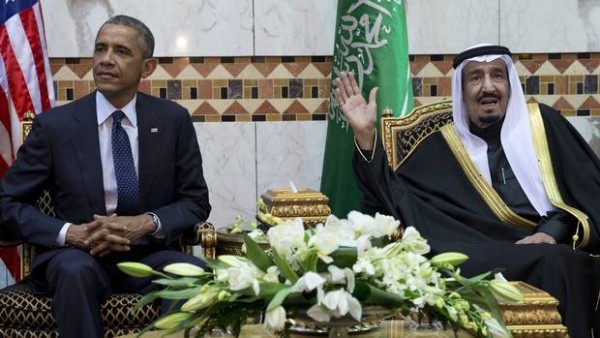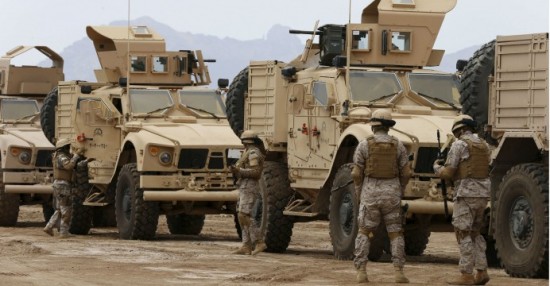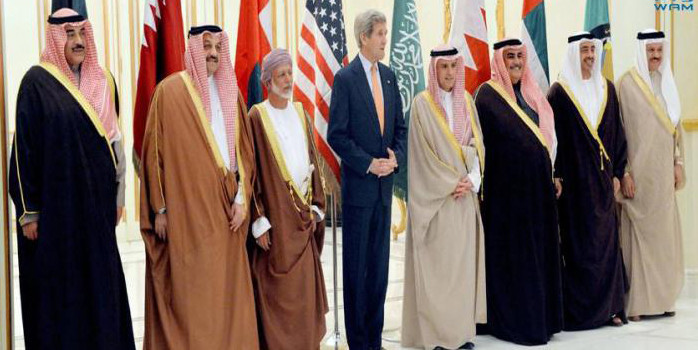PHOTO: Foreign Minister of the Gulf Cooperation Council countries with US Secretary of State John Kerry, April 2016
Aleksandar Mitreski, a defense and Gulf security analyst based in the UAE, writes for EA:
Over the past two years, the Gulf Cooperation Council under the leadership of Saudi Arabia has gradually shifted towards a foreign policy which is independent of the US. The Salman Doctrine, named after the king who took the Saudi throne in 2015, holds that Riyadh will inform the US of its intentions rather than coordinating and acting jointly at all times.
The policy is supported by the rest of the GCC members: Kuwait, Oman, UAE, Bahrain, and Qatar. It is far from a surprise, given numerous reasons for the shift. Prominent among these is Iran’s expansionist policy in the Arabian Peninsula, coupled with the outcome of the negotiations over the Iranian nuclear program. The demise of strong actors in the region – most notably Egypt and Iraq – created a power vacuum and further exacerbated concerns that Iran will expand its influence towards a goal of controlling the “Shia crescent”.
Equally important is the US policy change in the Middle East. The anticipated American pivot to Asia never occurred, but President Obama’s approach towards the Middle East and North Africa has projected a role eschewing leadership while seeking diplomatic solutions. Even those negotiations were not inclusive of the GCC members or accounted for their interests. This fed an explanation of Obama’s mistrust of the “so-called ally” Saudi Arabia.
The US has not disengaged from the Gulf. The American military presence has not altered, and their bases in the GCC are a key dimension of local security. Sales of military equipment have continued at the same pace. It can even be argued that the GCC’s new role fits in the US policy of supporting local actors rather than leading any intervention. However, it remains to be seen how the relationship with the US will be affected if and when the self-interest of the GCC collides with US foreign policy.
Allied But Different
Saudi Arabia, as the most powerful GCC member, requests the loyalty of others; however, the group remains a loose alliance rather than a monolithic security and political actor, and shaping a common foreign policy has been a traditionally difficult task. Qatar often pursues its own version of regional foreign policy, which sometimes is at odds with the rest of the GCC. As recently as 2014, the ambassadors of the UAE, Saudi Arabia, and Bahrain were recalled from Doha due to differences over policies towards the Muslim Brotherhood in the region.
Initiatives are based on a constant renegotiation of policy and often do not have the full support of all members. — for example, Oman abstained from the Saudi-led Operation Decisive Storm in Yemen. Individual GCC countries do not share the same role even when their regional interests are aligned: Saudi Arabia is joined by UAE and Qatar in a more interventionist foreign policy, even at the cost of military engagement. Bahrain and Kuwait follow suit, albeit at a much smaller scale of involvement. Oman has preserved its role of a mediator and offers negotiation venues rather than military support.
But in spite of differences, the GCC members share similar domestic and regional security concerns and see their unity as self-preservation in an increasingly volatile region. The strength of the union is in the ability to unite against a grave threat, seen time and again in cases such as the Gulf War, growing tensions with Iran, or the internal security risks due to the “Arab Spring”.
In the near-future, the GCC has to prove that its new approach of independent and increasingly interventionist policy is sustainable and will continue defining the geopolitics in the Arabian Peninsula. This change in behavior will be put to the test, establishing whether it is the right strategic move or whether the GCC will have to revert to deference to decisions taken in Washington.

President Obama with Saudi Arabia’s King Salman, December 2015
The Outlook in the Near-Future
Whether or not the GCC is able to endure in their quest for a self-reliant foreign policy will depend mainly on three factors: ability to financially sustain the strategy; military strength and weapons supply; and building/preserving alliances.
Finance
The sharp drop in the global oil price forced the GCC governments to adopt a dual role: one acknowledging the risks to economies and demonstrating care for the future of citizens; and a second as “unaffected” regional actors with unaltered military capabilities.
To fulfil the former, Saudi Arabia’s Deputy Crown Prince Mohammed bin Salman laid out an ambitious “Vision 2030” which demands aggressive diversification in the domestic economy, using unprecedented policy options. By 2018, the world’s most valuable company, the oil giant ARAMCO, will be presented for an initial public offering — an injection of funds needed as the Kingdom is believed to have used more than $150 billion in financial reserves since late 2014 and expects a high fiscal deficit in 2016.
The UAE has adopted a more conservative government spending policy, but cuts are tailored not to affect essential projects and job redundancies will be mostly, if not exclusively, expatriate laborers. Similar changes have taken place in other GCC countries, with the cutting of subsidies were cut. A comprehensive agreement to impose VAT will be implemented in 2018, with the framework defined in October 2016.
The long-term success of countries’ strategies to ensure economic resilience and domestic stability will be of paramount importance for the projection of power. However, in the short term, financial stability seems secured and the countries’ sovereign wealth funds are there to ensure consistency.
Military strength and Arms Supplies
For now, both military strength and weapons supply also appear to be assured. Amid the high oil price bonanza in the years before 2014, GCC countries obtained state-of-the-art military systems. Steady partnerships with preferred weapon-exporting countries (US, UK, France) were maintained, and many of the weapons deals are long-term commitments not only for sales but also for repair and upgrades.
Periodically there are efforts to challenge the ethics of the weapons deals, such as recent calls by Senator Rand Paul in the US and lobbying groups in the UK to oppose a scheduled weapons sale to Saudi Arabia. However, these are unlikely to cancel or even postpone a major weapons purchase, given that Washington and London are advancing their own policies in the region.
The situation is more complicated for arms needed for empowering proxies in regional conflicts. In Syria, the Assad regime — backed by Russia, Hezbollah, and Iran’s Revolutionary Guard Corps — has endured. In Iraq, the US estimates there are 80,000 to 100,000 Iranian-backed Shia militia members in Iraq.
Supplying small arms to rebel groups who present issues over ideology or reliability as allies can invite condemnation. This has prompted the Saudis to search for suppliers elsewhere, with imports of large amounts of arms from Central and Eastern Europe. Serbia’s Prime Minister Vucic recently said (http://www.balkaninsight.com/en/article/serbia-pm-defends-lucrative-saudi-arms-sales-08-02-2016-1), “I adore it when we export arms”, and explained that since there is no embargo against Saudi Arabia, the sales will proceed as planned.
Military performance will also have to be demonstrated. The initial success of the offensive led by the UAE and the Saudis in Yemen has been halted. As the intervention protracted, losses of both personnel and equipment have increased.
In response, Saudi Arabia has declared a one-month bonus salary for its troops involved in the war. UAE has paid tribute to its soldiers, dedicating November 30 as Martyrs’ Day celebrating fallen soldiers. While keeping the morale high among the troops is important, emphasis should be put on increasing effectiveness on the battlefield. There is the long-standing stigma of the Gulf militaries that they are armies with expensive equipment but little efficacy. The intervention in Yemen should challenge those views and demonstrate the GCC military resolve in regional conflicts.

Saudi troops near the port city of Aden in southern Yemen
Alliances
When the GCC responded to President Hadi’s letter for assistance in Yemen, its pledge of support was accompanied by Egypt, Jordan, Morocco, and Sudan. However, creating alliances proved to be a difficult task. Saudi Arabia’s call for Pakistani involvement was rejected by the Parliament in Islamabad. Other countries did not necessarily share burdens, with some GCC members employing mercenaries to supplement their intervention.
Foreign aid has been leveraged heavily towards strengthening Arab regional partners and assistance can be withdrawn as a punishment. The GCC pledged a combined $12.5 billion to stabilize Egypt and promote President Abdel Fattah al-Sisi’s leadership in 2015. In return, Egypt joined Saudi Arabia in backing of a 40,000-strong army as it agreed “in principle” to participate in an Arab Force.
But Egypt has not returned to its pre-2011 status and Sisi has stepped back, maintaining that “the Egyptian army is only for Egypt“. The Arab League Summit in Mauritania in July 2016 took place without the presence of Egypt or Saudi Arabia.
With no viable plan for a pan-Arab military force, Saudi Arabia proposed the second best-initiative of a 34-nation Islamic alliance at the end of 2015. Months later, after a large military exercise, it was suggested that Pakistan could develop the framework for a NATO-like structure and that Turkey would assume a significant role, having opened a military base in Qatar.
GCC members have also shown unusual closeness to Israel. The Israelis are opening a diplomatic mission to the International Renewable Energy Agency (IRENA) in Abu Dhabi. In July, a Saudi delegation visited Israel, confirming long-standing bilateral contacts over security information. This month UAE participated in the Red Flag joint military exercise in Nevada alongside Israeli pilots.
Then there are relations with the major outside powers. As the GCC considers a fresh start with the new American president after January 2017, it has a strategic dialogue with Russia including a fourth meeting this year, even if the talks have not produced any significant
results. Meanwhile, the Gulf countries are likely to continue to explore opportunities for containing Russia’s influence beyond Syria and Iran, and are watching Russia’s possible partnership with Turkey for joint actions in Syria and Iraq, which would test for the GCC ability to preserve its alliance with Ankara.
Conclusion
The GCC will continue facing much of the current challenges regarding their domestic stability and regional security threats. However, due to their domestic strategies for economic stability, ability to purchase advanced military systems and small weapons, and by creating multiple alliances and platforms for cooperation in the region, the GCC is able to continue its independent foreign policy approach.
As a result, in the near-future GCC-US relations could be unpredictable. The relationship between the two could continue in a similar way as during the Obama Administration, with tense but ongoing cooperation. However, while it is less likely, the US and the GCC could find themselves with colliding regional objectives. Opportunities for such divergence can arise from issues such as the outlook of a post-ISIS Iraq, the nature of the peace solution in Yemen, or approaches to Iran in case of a breakdown of the Iranian nuclear deal.
This could mean trouble since the GCC will not be easily persuaded to follow the US strategy, as it has done in the past. But it is important to note that such friction is expected to be below the threshold which will prompt the US to do a strategic change in the Gulf (disengagement) or the GCC to turn to the East. The possible rift may test the strength of the GCC-US partnership, but it will not break it apart.

